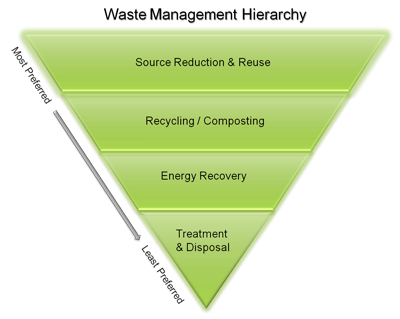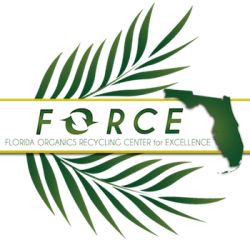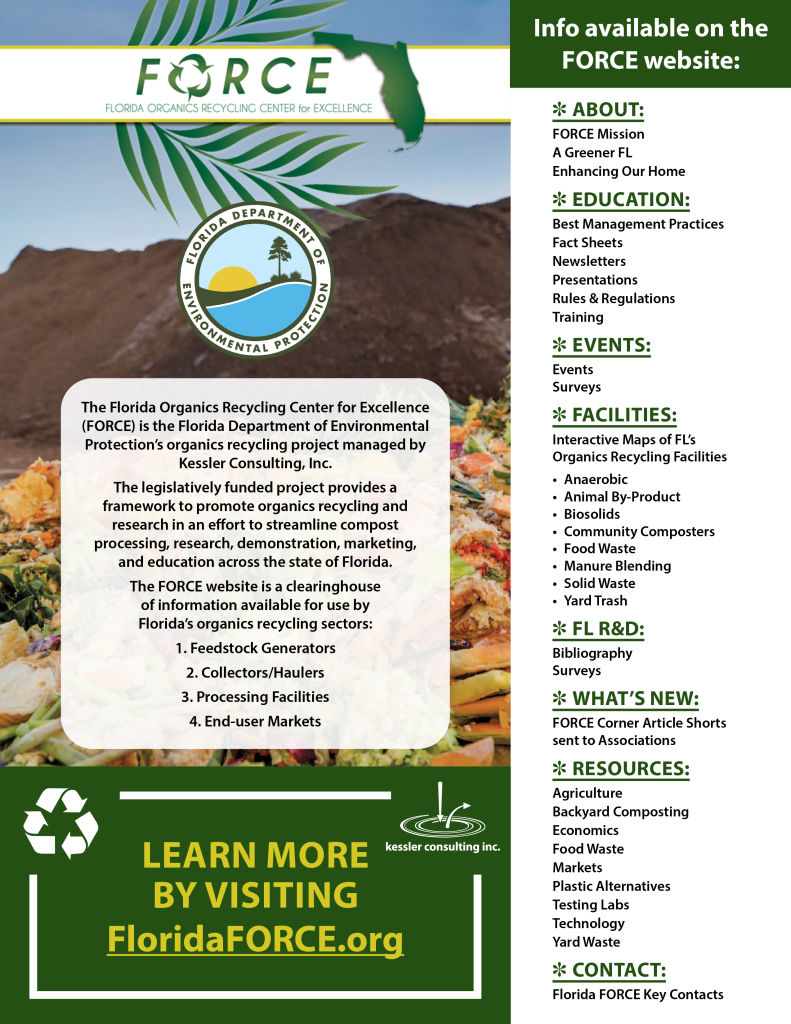PLASTIC ALTERNATIVES IN FLORIDA
PLASTICS & ORGANICS RECYCLING
Plastic that is compostable is biodegradable, but not every plastic that is biodegradable is compostable. Biodegradable plastic can be engineered to biodegrade in water or soil, compostable plastic means biodegradation into soil conditioning material (e.g. compost) under a certain set of conditions. If a plastic is labeled commercially compostable it must be able to be broken down by biological treatment at a commercial, public or industrial composting facility.
These definitions often lead to non-compostable products entering the compostable waste stream that lead to a lower value or unmarketable product. The standards that outline the specifications that must be met in order to label a plastic as commercially compostable are the American Society for Testing and Materials (ASTM) Standards D6400 and D6868. At this time, there are currently no ASTM standard test methods in place for evaluating the ability of a plastic to decompose in a residential home setting.
The organics recycling industry in Florida does a lot to educate participants in compost programs to recover the correct material for composting programs in a commercial setting. And many commercial establishments have been streamlining their procurement programs to focus on biodegradable, compostable or reusable products to help improve their participation in composting programs. It has also created an increase in products available in the market for alternatives to plastic. With the recent international movement to reduce pollution in the ocean and other waterways, alternatives to plastic have become an important topic.
PLASTICS, THE ENVIRONMENT & FLORIDA'S COASTLINE
With over 8,000 miles of coastline, the state of Florida is well known for its beautiful beaches and waterways which help to draw more than 100 million visitors a year. Visit Florida estimates that in 2017, tourists spent approximately $88.6 billion, funding the livelihood of the more than 940,000 employees of the tourism industry, Florida’s 5th largest employer statewide1, marking the tourism industry as a major economic driver for the state.
You may be thinking, “What does all of this even have to do with alternatives to plastics in Florida?” Well, these facts and figures help to illustrate the economic importance of the state’s beaches and waterways. While natural environments of the state are important to residents and visitors for recreation, these features also hold incredible economic value for local communities and the overall state. Protecting the health and vitality of our world-famous beaches and waterways is a paramount concern as these environments are increasingly threatened by polluting plastics and garbage. For this reason, plastic pollution has become an important topic in Florida, following the national and international concerns for the health of our oceans and safety of marine life.
ENERGY RECOVERY
Unfortunately, plastic wastes cannot be processed in waste-to-energy facilities, making refuse, reduce, recycle and reuse the best options to minimize plastic wastes.
TREATMENT & DISPOSAL
Treatment: Waste treatment reduces the volume of toxicity in waste materials through physical, chemical and biological processes.
Disposal: After treatment, waste products are transferred to disposal sites, or landfills that are managed by local governments. Unfortunately, due to the durable nature of plastics, once landfilled plastic wastes take hundreds of years to decompose.
THE EPA'S WASTE MANAGEMENT SYSTEM

The US EPA has developed a waste management hierarchy to guide industry decision makers, residents and business in the disposal of waste materials, which includes plastic waste.
SOURCE REDUCTION & REUSE
Source Reduction: Source reduction minimizes the amount of plastic waste materials generated at the source through different methods such as refusing plastic products, especially single-use plastics, reusing or donating plastic items, or buying in bulk for reduced packaging. Consumers are also encouraged to purchase products with recycled content to help ensure the market for these materials persists and closes the recycling loop. Many recycled content products are currently available, for more information visit the EPA’s webpage here.
Reuse: Reuse asks consumers and businesses to choose reusable options over disposable, single use products, and suggests reusing plastics at home to divert these difficult materials from the waste stream. Hardy plastic containers can often be repurposed around the house, or even put to creative use for projects in the classroom.
RECYCLING & COMPOSTING
Recycling: Local Florida governments offer robust commercial and residential recycling programs to collect many types of plastic for recycling or processing. Despite the existence of recycling programs across the state, plastic waste materials, especially single use plastics such as grocery bags, continue to litter Florida’s natural environments and waterways. Unfortunately, due to the material’s low value and the difficulties associated with processing plastic film, government managed recycling programs do not accept grocery bags or similar materials for processing. Instead plastic film can be delivered to grocery retailers such as Publix, Target and Walmart, all of which provide collection bins at the front of their stores. To help prevent plastic litter from defacing our state, it is important to stay up to date on which types of plastics are accepted by your local recycling program, and to participate in recycling services offered in your community.
Composting: Compost is organic matter that has decomposed and to produce a nutrient rich soil conditioner. Composting organic food wastes at your home or business helps to divert these wastes from taking up limited landfill space. As plastic wastes continue to threaten natural environments across the globe, biodegradable plastic alternatives derived from plant materials are becoming more readily available to businesses and consumers. While plastic alternatives may not backyard compostable, many local governments are beginning to develop large scale composting facilities to process compostable and biodegradable waste materials.
LABELING & DEFINITIONS
Understanding labeling and product definitions is important when discussing or writing about plastic alternatives. All plastic alternatives should meet the definitions and standards set forth by the American Society for Testing and Materials (ASTM). ASTM standards (D6400 or D6868) require both individual product and individual ingredient testing for biodegradability. To be certified as biodegradable, finished products must both disintegrate, and pass tests for plant toxicity and heavy metals.
The Federal Trade Commission (FTC) is the responsible party for enforcement against false or deceptive product labeling. These organization help products meet material requirements and help to prevent miscommunication and product greenwashing to the general public.
Certification in the U.S. is provided by, the Biodegradable Products Institute (BPI). The U.S. Composting Council recognizes BPI as North America’s leading standard for certified compostable products and packaging. A non-profit organization established in 1999, BPI’s program ensures that products and packaging displaying their logo have been independently tested and verified according to scientifically based standards before receiving certification. BPI promotes best practices for the diversion and recovery of compostable materials through municipal and commercial composting. They also have a searchable database for BPI certified products.
Helpful Links:
DEFINITIONS
Plastic Categories: There are two general categories
1. Thermoplastics: Can be mechanically recycled through a heat and pressure process.
2. Thermosets: Cannot be mechanically recycled due to its chemical bonding makeup.
Biodegradable Plastic: Products created from ingredients that can be consumed by microorganisms, allowing finished products to physically break down during composting.
Compostable: Products susceptible to biological decomposition in an aerobic compost system, such that the material becomes visually indistinguishable, breaking down into carbon dioxide, water, inorganic compounds, and biomass.
Compostable Product: Any product specifically manufactured to break down in a compost system at the end of its useful life. It can be made from plastic, paper, or plant fibers, along with other ingredients that provide necessary form and functionality. These types of products include items such as bags, take-out containers, coffee pods, food packaging, cups, plates and service ware that are used and purchased by the food service industry, convenience stores and grocery stores.
Thermoplastics
Commodity Grade Plastics (residential)
Post-consumer recycled content is defined by the Federal Trade Commission as recycled content material that has been recovered or diverted from the municipal solid waste stream. An example of that is an empty plastic soda bottle that has been placed in a recycling bin or cart.
To that end, a coding resin system was developed by the Society of Plastics Industries:
#1 - Polyethylene Terephthalate (PETE )
#2 - High Density Polyethylene (HDPE)
#3 - Polyvinyl Chloride (PVC)
#4 - Low Density Polyethylene (LDPE)
#5 - Polypropylene (PP)
#6 - Polystyrene (PS)
Unfortunately, not all plastic is recyclable in your curbside bin or cart. It is important to know which plastics your local government accepts in any residential or commercial recycling program to keep materials clean and free of contaminants, i.e., the wrong plastic materials, so they can be marketed properly and turned into new products.
Marketing of post-consumer plastic requires separation and sorting from other curbside recyclable material after it is received at a Materials Recovery Facility (MRF). In post-consumer plastics recycling, recent developments in automated identification and sorting technology (laser technology) have increased the economic competitiveness for recycled materials. Even though new technologies have made recycling easier than ever, products are only recyclable if there is a market for that material in your area, so remember to stay up to date with your local recycling guidelines.
Once they leave a MRF, materials are sent to plastic reclamation facilities for further processing, where they are sorted, chopped, and washed. Reclamation facilities produce three categories of plastic feedstock used for manufacturing new plastic products, including:
- Flake--chopped plastic containers.
- Powder--pulverized flake.
- Pellet--flake that is mechanically melted, extruded, and cut into beads.
The U.S. Food and Drug Administration (FDA) maintains a list of companies that have received FDA approval to manufacture and sell recycled-content plastic containers for food contact applications.
Plastic Bags and MRFs: Plastic bags are a plastic film material that consumers often place in recycling or compost containers, but plastic film is a problematic contaminant for MRF facilities and plastic bags should instead be reused or returned to grocers and retailers who collect plastic bags at store locations. MRF facilities use automated equipment to shake, rattle and roll waste materials for sorting and plastic bags often get caught in sorting equipment causing delays in operation and creating serious problems for MRF equipment. Plastic bags are often difficult to compost unless they are certified by the Biodegradable Products Institute (BPI).
Engineered Grade Plastics
Plastics recovered from durable goods waste streams, such as brown goods (electronics such as computers) and automobiles (vehicles), are considered engineered grade plastics. These plastics contain blended resins and/or additives that increase properties such as rigidity, and chemical, fire, and impact resistance. Below are a few of the common engineering grade plastics used by the manufacturing and industrial sectors:
- Acrylonitrile-butadiene-styrene (ABS)
- Polyurethane (PU)
- Nylon
- Polycarbonate (PC)
The U.S. Department of Labor Statistics provides a searchable database to identify industries and establishments associated with resin production, distribution and use. Standard Industrial Classification (SIC) codes are provided for these entities.
ALTERNATIVE MATERIALS TO PLASTIC
Disposable items are essential, especially for food and beverage services, but plastic disposables should be utilized in the appropriate application. There are many products on the market and in development that are environmentally preferable alternatives to plastics. These alternatives are often developed to be compostable or ideally, biodegradable. Several popular alternative materials are currently available, and listed below:
Bagasse: Natural byproduct of sugarcane industry.
Bamboo: Considered to be a rapidly renewable wood product with low emissions.
Bioplastics: PLA is a biodegradable type of plastic that is manufactured from plant based resources such as corn starch or sugar cane. PLA products without additives are compostable, but often only in a municipal composting facility.
- Chitosan: Made from a combination of crab shells and cellulose.
- Glass: Is being used as an alternative to plastic or paper straws.
- Liquid Wood: Made from pulp-based lignin, a byproduct of papermaking process.
- Mushrooms: Agricultural waste mixed with mycelium and molded into shapes.
- Paper: Recycled-content and virgin paper has always been an alternative to plastic.
- Seaweed Sachets: Edible, tasteless and biodegradable in six weeks.
- Soy: Soybean protein offers a sustainable alternative to conventional fossil fuel-based plastics as a domestically grown, renewable, and biodegradable.
ADDITIONAL RESOURCES FOR Retailers, Restaurants & Businesses
The spreadsheet below offers useful information on the dialogue and debate regarding plastic alternatives. The attachment and references on this page are not endorsing any company or organization but was developed to provide basic educational information on the subject.
FLORIDA'S PLASTIC BANS
Please Note:
The following City ordinances and resolutions are listed below to only provide examples of the language utilized by local governments. The majority of these ordinances have been cancelled or repealed due to litigation issues. Please contact the local government for the details.
Alachua County, FL
Specification:
City-wide ban on all plastic bags 2.25 miles or less
Implement Date:
1/1/2020
Notes:
Bal Harbour, FL
Coral Gables, FL
Delray Beach, FL
Specification:
Encourages city-wide businesses to reduce use of polystyrene foam products.
Encourages city staff to negotiate “no-polystyrene” clauses into vendor contracts.
Implement Date:
Oct. 2020
Notes:
Gainesville, FL
Specification:
City-wide ban on all plastic bags 2.25 miles or less
Implement Date:
8/1/19
Notes:
Hollywood, FL
Specification:
Ordinance prohibiting the use of single-use plastic products, such as water bottles, utensils, cups and plates, and expanded polystyrene foam coolers in city parks, city facilities and the beach, in addition to a ban on intentional balloon releases.
Implement Date:
10/21/2020
Notes:
Miami-Dade County, FL
Specification:
Miami-Dade County resolution to eliminate single-use plastics and styrofoam at county facilities.
Implement Date:
11/20/2024
Notes:
Palm Beach, FL
Specification:
City-wide ban on all plastic bags
Implement Date:
12/12/19
Notes:
St. Augustine Beach, FL
Surfside, FL
Specification:
City-wide ban on all plastic bags
Implement Date:
3/1/2020
Notes:
PFAS
US Composting Council Releases Positioning and Guidance Statement on PFAS
The US Composting Council, on behalf of an industry facing detrimental economic impacts from per- fluoroalkyl compounds (PFAS) found in all consumer products, is calling for bans on the use of the chemicals and immediate research to study their impacts on plant uptake. The document notes the negative impact of PFAS, used historically in everyday materials, such as cookware, cosmetics, packaging, and outdoor clothing, have on compost manufacturers. The composting industry is the passive receiver of the chemicals through the products brought into facilities through food waste, biosolids and to a lesser extent, green waste. Read More
PFAS or per-fluoroalkyl compounds are a group of manufactured chemicals that have been used in industry and consumer products since the 1940s because of their useful properties. There are thousands of different PFAS, some of which have been more widely used and studied than others. Many PFAS break down very slowly and can accumulate in people, animals, soil, and the environment over time. To learn more about PFAs visit the EPA website here.

